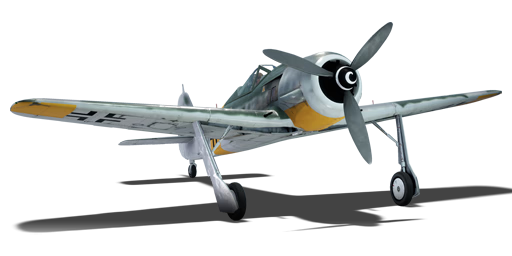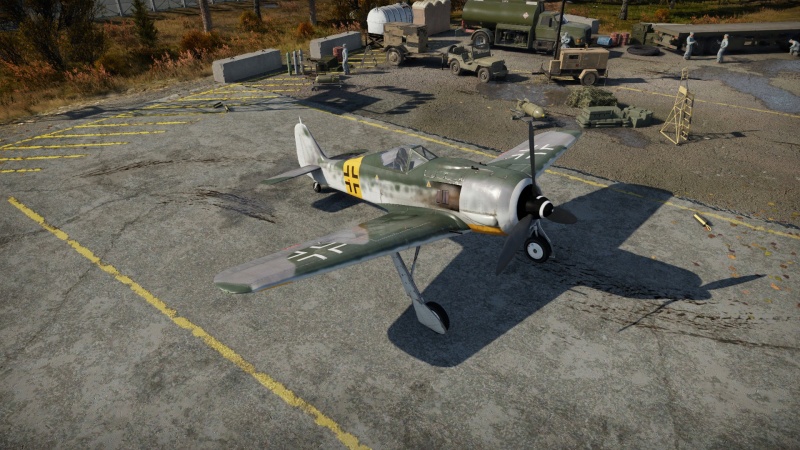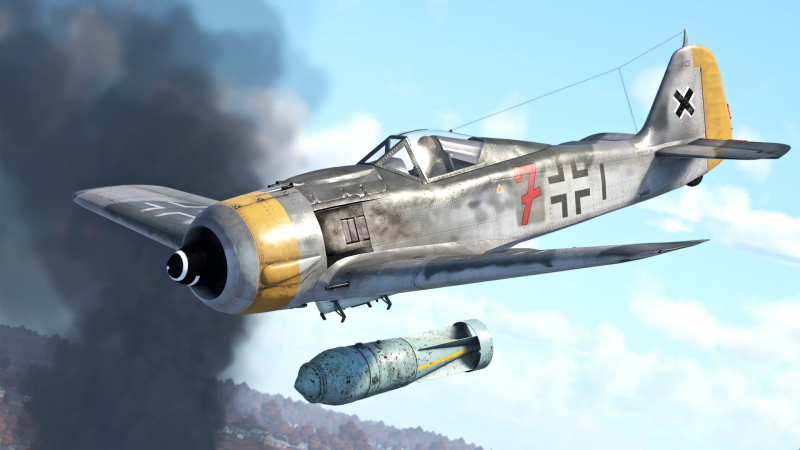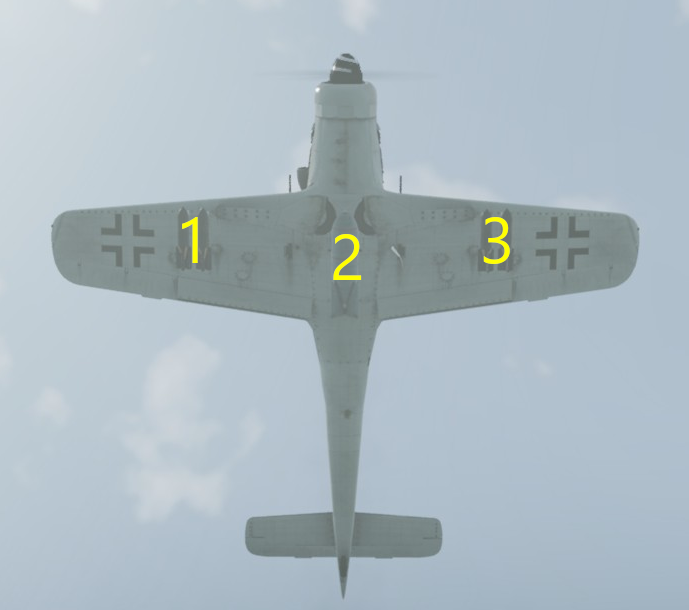Fw 190 F-8
| This page is about the German strike aircraft Fw 190 F-8. For other versions, see Fw 190 (Family). |
Contents
Description
The Focke-Wulf Fw 190 F-8, nicknamed "Würger" (Shrike), was the main serial production of the F-series Fw 190 fighter. The F-series were designed as multirole ground attack fighter-bomber aircraft meant to replace the obsolete Ju 87 dive bomber. The F-8 variant was based on the Fw 190 A-8, featuring a reinforced airframe to allow it to carry its payload of up to a 1,000 kg bomb. To compensate for the worsened flight performance, the F-8 featured a slightly modified compressor injector which improved the engine's performance at low altitudes. Despite 6,143 F-8 models being produced, it could never fully replace the Stukas this late into the war (1944), and as such often ended up being used as a low altitude fighter-interceptor instead of its ground attacking role.
Being in the game since the start of the Open Beta Test prior to Update 1.27. The Fw 190 F-8 is a Fw 190 who thought it was a Stuka. The F-8 version is a peculiar one, being classed as a strike aircraft due to its relatively heavy suspended armaments. As an attacker, this Focke-Wulf gains mid-air start on most maps which can either be used to get to ground targets quickly or get the jump on climbing fighters. While generally more sluggish than the A-8 variant, the F-8 features a 30 mm gun pods that allows it to dismantle the enemy planes in a few hits. The F-8 is perhaps one of the most versatile Fw 190s in the game, though it tends to be outperformed in most categories by more specialised planes.
General info
Flight performance
Being essentially a modified Fw 190 A-8 for ground attacking role, the Fw 190 F-8's general flight performance is generally similar to the A-8, though being noticeably more sluggish to handle, especially while stock. The F-8 retains the typical handling of the Fw 190 series; good roll rate and high-speed handling, but mediocre climb rate and atrocious turn rate. Which means it can perform reasonably well as a boom-and-zoom fighter, though not as well as dedicated fighter variant. The F-8's heavier airframe resulting into the plane often struggle in a prolonged dogfights, as it will haemorrhage its energy much faster than other dedicated fighters.
A caveat worth noting is that, while the F-8 can perform as a boom-and-zoom fighter, it suffers from rudder lock-ups at higher speed (~650 km/h), which may results in a fatal failed-pull ups if the pilot are not careful. On the plus side, while the F-8 does not have dedicated combat flaps, the take off flaps can be used in place of it to improve its manoeuvrability due to its unusually high rip speed (~700 km/h).
As it was classified as a strike aircraft, the F-8 greatly benefits from its access to an air spawn, as it gains a head start speed to help it climb up to medium altitudes (~3,000 - 4,000 m) at the start of the match. This allows the F-8 to gain an altitude advantage against most fighters, and even capable of intercepting bombers.
| Characteristics | Max Speed (km/h at 5,400 m) |
Max altitude (metres) |
Turn time (seconds) |
Rate of climb (metres/second) |
Take-off run (metres) | |||
|---|---|---|---|---|---|---|---|---|
| AB | RB | AB | RB | AB | RB | |||
| Stock | 605 | 585 | 11100 | 24.5 | 25.5 | 11.7 | 11.7 | 453 |
| Upgraded | 670 | 635 | 21.9 | 23.2 | 21.7 | 15.8 | ||
Details
| Features | ||||
|---|---|---|---|---|
| Combat flaps | Take-off flaps | Landing flaps | Air brakes | Arrestor gear |
| X | ✓ | ✓ | X | X |
| Limits | ||||||
|---|---|---|---|---|---|---|
| Wings (km/h) | Gear (km/h) | Flaps (km/h) | Max Static G | |||
| Combat | Take-off | Landing | + | - | ||
| 912 | 310 | N/A | 700 | 310 | ~13 | ~6 |
| Optimal velocities (km/h) | |||
|---|---|---|---|
| Ailerons | Rudder | Elevators | Radiator |
| < 420 | < 300 | < 550 | > 320 |
Survivability and armour
- 6 mm Steel - Fore cowl ring
- 10 mm Steel - Cowl ring
- 6 mm Steel - Under engine armour
- 8 mm Steel - Under cockpit/fuel tank armour plate
- 5 mm Steel - Rear fuel tank armour
- 8 mm Steel - Pilot's chair armour
- 6 mm Steel - Pilot's chair armour
- 12 mm Steel - Headrest armour
- 57 mm Bulletproof glass - armoured windscreen
Modifications and economy
The attacker "Würger" has such awful responsiveness from the elevator that anything which improves turn rate should have the highest priority. Otherwise, it will kiss the ground more than cows do! Don't forget, it needs to dive-bomb to hit anything. And grinding the bombs cannot be forgotten!! This is an attacker, so it needs the payload unlocks, but without performance upgrades, it is just a pain to fly. A detour to the new belts could be considered, but two 20 mm cannons are enough to handle any ground units even with stock ammunition, especially as the other performance upgrades are necessary as well due the F-8's great weight.
Armaments
Offensive armament
The Fw 190 F-8 is armed with:
- 2 x 20 mm MG 151 cannons, wing-mounted (250 rpg = 500 total)
- 2 x 13 mm MG 131 machine guns, nose-mounted (400 rpg = 800 total)
As with any 20 mm-armed German planes, the Würger starts out with an underwhelming default belt that were less than ideal to use against enemy aircraft. Though due to its role as a strike aircraft, you can still uses the 20 mm autocannons against soft ground targets (MG nest, artillery, light pillbox, etc.) with reasonable efficiency. Then after you have unlocked the belt options with Minengeschoß rounds, the Würger can then finally be used as a fighter-interceptor like how it was in real life.
The 13 mm IAI belts are extremely potent against bomber and fighter aircraft alike; featuring a mere 1 g of explosive mass. The belts have a strong chance to simply rupture the airframe or disable many flammable modules at the same time.
In addition, the Würger also has an option to equip two 30 mm gun pods with 70 rounds in total. The 30 mm rounds are extremely powerful against any air targets, though it often requires trigger discipline due to the low ammo count of 70 rounds.
Suspended armament
The Fw 190 F-8 can be outfitted with the following ordnance:
| 1 | 2 | 3 | ||
|---|---|---|---|---|
| 30 mm MK 103 cannons (35 rpg) | 1* | 1* | ||
| 50 kg SC50JA bombs | 2 | 4 | 2 | |
| 250 kg SC250JA bombs | 1 | |||
| 500 kg SC500K bombs | 1 | |||
| 500 kg PC500 bombs | 1 | |||
| 1,000 kg SC1000L2 bombs | 1 | |||
| 1,000 kg PC1000 bombs | 1 | |||
| Flam C 250 incendiary bombs | 1 | |||
| Flam C 500 incendiary bombs | 1 | |||
| Pb2 rockets | 7 | 7 | ||
| Maximum permissible loadout weight: 1,220 kg | ||||
| * Cannon pods must be equipped together | ||||
| Default weapon presets | |
|---|---|
| |
Usage in battles
The Fw 190 F-8 possesses below average speed, acceleration and climb ability for its rank. If you spot a bandit at the same altitude, a recommended tactic is to head-on attack, followed by an evasive manoeuvre and then extending away to repeat the processes. If a bandit has superior energy/altitude and is trying to attack you, try to drag them to friendlies, but don't sacrifice too much altitude to do so. If you are skilled enough, another tactic would be to initiate scissors; either rolling or flat, and then break away when he goes to yo-yo to control his overshoot. The scissors manoeuvre is a highly effective manoeuvre in the 190s. Many good pilots have dismembered many superior aircraft simply because of the roll rate and firepower this plane possesses. If you are clever enough to press for a gun solution when scissoring an enemy, you could be greatly rewarded.
In summary for the unintended fighter-role, climb to the side or continue climbing when starting mid-air, Boom & Zoom like a champion, never get in a sustained turn fight, and use the rate of roll to free yourself when cornered. The F-8 is most likely to be successful in realistic battles when used as a ground-attacker or bomber hunter. B-17s and Halifaxes are unlikely to fly at higher altitudes than the F-8 can perform at, which allows for the F-8s armament (especially with the 30 mm gunpods) and decent durability to be useful while not being held back by its relatively poor dogfighting capability. It is best to make quick, diving attack passes targeting the wings and engines before extending out to avoid return fire from the bomber's defensive guns. Do not turn back until you are at least 1 km away from the bomber to avoid being an easy target. Until the frontal gunpods are unlocked, 2-3 passes may be required to fully destroy a bomber. Frontal attacks can also be effective especially with the engines and cockpit both viable targets, but with the trade-off being less time to shoot at the target (this goes both ways, you won't be in the range of defensive guns for very long either).
In combined forces battles, the Fw 190 F-8 can carry a wider range of ordnance than most other German fighters, allowing for ground-attack using rockets, gun pods, bombs or equipping them together because of the ability to make custom load-outs. The 1,000 kg bomb is unique to F-8 among German fighters; while the Do 335 (A-1 & B-2 variants) and Me-410 (A1 & B1 variants) can carry 1,000 kg worth of bombs, they can only carry 250 kg and 500 kg bombs. The F-8 combines the ability to carry heavy ordnance while still retaining decent fighting capability after dropping said ordnance.
Manual Engine Control
| MEC elements | ||||||
|---|---|---|---|---|---|---|
| Mixer | Pitch | Radiator | Supercharger | Turbocharger | ||
| Oil | Water | Type | ||||
| Not controllable | Controllable Auto control available |
Not controllable Not auto controlled |
Controllable Not auto controlled |
Combined | Not controllable 2 gears |
Not controllable |
Pros and cons
Pros:
- Retains most of the positive flight qualities of the Fw 190 series: Good roll rate and high speed handling
- While the plane does not have a delicated combat flaps, the take-off flaps can be used in place of it due to its very high rip speed (~700 km/h)
- Has an airspawn, allows the plane to easily get a headstart above most fighters and intercept bombers
- Heavy suspended weapon options, including up to 1,200 kg of bombs or 30 mm gun pods with an access to anti-tank rounds
- Powerful main armaments with high ammo capacity, the 30 mm gun pods can further augmented the plane's firepower with minimal performance loss
- Very durable airframe, capable of taking a lot of punishments
Cons:
- Awful stock grind; the plane is essentially a worse Fw 190 A-8 when its offensive armaments and flight performances were not upgraded
- Heavier and more sluggish than other Fw 190 variants, resulting into worsened handling, often got beaten by delicated fighters in a dogfight
- As with other Fw 190 variants, the plane's climb rate is rather mediocre and the turn rate is terrible
- Carrying heavy payload will significantly reduces the plane's flight performance
- Rudder is unresponsive at higher speeds (~650 km/h), which may causes the plane to crash into the ground, especially while stock
History
| Archive of the in-game description | |
|---|---|
|
The Focke-Wulf Fw 190 Wuerger (Shrike) was a single-seat single-engine monoplane fighter used by the Luftwaffe in WWII. One of the best fighters of the time, it was widely used during the Second World War. A total of over 20,000 were produced, including some 6,000 fighter-bomber variants. The 190 remained in production from 1941 until the end of the war, going through multiple redesigns. The Fw 190 made a name for itself as a true Luftwaffe workhorse and was used in a wide variety of roles, including a high-altitude interceptor (especially the Fw 190D), escort fighter, fighter-bomber and night fighter. The Fw 190 F-8 was the most mass-produced variant of the Fw 190 F series, based on the Fw 190 A-8. By March 1944, Fw 190 F-8s were also produced by the Arado company in Warnemuende, and by April the NDW company in Wismar. The aircraft was powered by the BMW 801 D-2 engine with improved injector on the compressor, which provided emergency power for up to 10-15 minutes at 1,000 m of altitude. Otherwise, the plane's equipment was largely similar to the A-8, although the FuG 16 ZY radio was replaced with the FuG 16 ZS in April 1944. This allowed direct communication with ground troops on the battlefield. A distinctive characteristic of the F-8 was a widened rear canopy. The new canopy was introduced in the latter half of 1944. It improved forward and downward visibility, which was very important for ground attack. On-board armament consisted of twin MG 131 machine guns in the fuselage and two MG 151/20E cannon in the wings. | |
Media
- Skins
- Videos
See also
- Related development
External links
| Focke-Wulf Aircraft Corporation (Focke-Wulf Flugzeugbau Aktiengesellschaft) | |
|---|---|
| Fighters | Fw 190 A-1 · Fw 190 A-4 · Fw 190 A-5 · Fw 190 A-5/U2 · Fw 190 A-5/U12 · Fw 190 A-5/U14 · Fw 190 A-8 |
| Fw 190 C | |
| Fw 190 D-9 · Fw 190 D-12 · Fw 190 D-13 | |
| Fw 190 F-8 | |
| Ta 152 C-3* · Ta 152 H-1* · Ta 154 A-1* | |
| Bombers | Fw 189 A-1 · Fw 200 C-1 |
| Export | ▅Fw 190 A-5 |
| Captured | ▃Fw 190 A-8 · ▂Fw 190 D-9 |
| * In 1944, the Germany Air Ministry changed new fighter aircraft designation to that of the chief designer. Kurt Tank was the chief designer at Focke-Wulf and later aircraft he designed were given the prefix of Ta. | |
| Germany strike aircraft | |
|---|---|
| Messerschmitt | |
| Bf 110 | Bf 110 C-6 · Bf 110 C-7 · Bf 110 F-2 · Bf 110 G-2 · Bf 110 G-4 |
| Me 410 | Me 410 A-1 · Me 410 A-1/U4 · Me 410 B-1 · Me 410 B-2/U4 · Me 410 B-6/R3 |
| Dornier | |
| Do 335 | Do 335 A-0 · Do 335 A-1 · Do 335 B-2 |
| Focke-Wulf | |
| Fw 190 | Fw 190 F-8 |
| Heinkel | |
| He 219 | He 219 A-7 |
| Henschel | |
| Hs 129 | Hs 129 B-2 · Hs 129 B-2 (Romania) · Hs 129 B-3 |
| Junkers | |
| Ju 87 | Ju 87 G-1 · Ju 87 G-2 |
| Foreign: | |
| USSR | ▀IL-2 (1942) |







